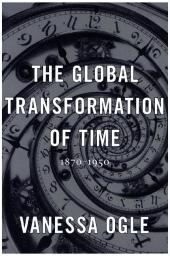 Neuerscheinungen 2015Stand: 2020-02-01 |
Schnellsuche
ISBN/Stichwort/Autor
|
Herderstraße 10
10625 Berlin
Tel.: 030 315 714 16
Fax 030 315 714 14
info@buchspektrum.de |

Vanessa Ogle
The Global Transformation of Time
1870-1950
2015. 288 S. 242 mm
Verlag/Jahr: HARVARD UNIVERSITY PRESS 2015
ISBN: 0-674-28614-6 (0674286146)
Neue ISBN: 978-0-674-28614-6 (9780674286146)
Preis und Lieferzeit: Bitte klicken
This book is a revisionist account of attempts to unify clock times, calendars, and social time, and a methodological intervention in discussions about writing global and transnational history. The book uses the reform of time between 1870 and 1950 as alens through which to understand the dynamics of globalization. Based on research in archives around the world in multiple languages, individual chapters take the story of uniform time to France and Germany, Britain, the British Empire/German colonies/Latin America, British India, Arab elites in the Levant, Muslim scholars in Egypt, and to the League of Nations. The author shows how cross-border flows of ideas and concepts of uniform time resulted in a nationalization and regionalization of temporal identities. As a consequence, uniform, accurate clock time remained nonstandardized, unstable, and incomplete as late as the 1930s and 1940s. Calendar reform, just as vivid and vast a field of activism as clock time, never came to pass altogether due to strong national and religious objections to a uniform World Calendar. When ideas about uniform time moved across borders and continents, they often did so along lateral, informal trajectories of transmission. Local initiatives often preceded national time politics. Top-down attempts to devise time reform schemes at international conferences, to implement them nationally, and assure application in the most remote local contexts rarely succeeded. Rather, globalization disheveled such hierarchies of the international, the national, and the local. The book, then, emphasizes the importance of nationalism and states as well as attention to scale in writing the history of global flows and connections.


